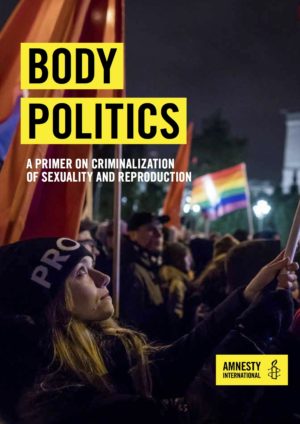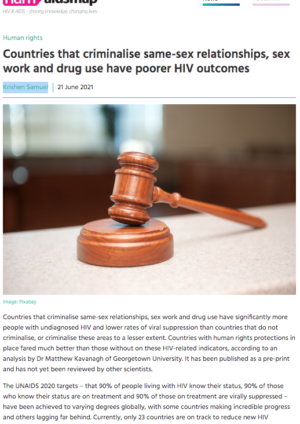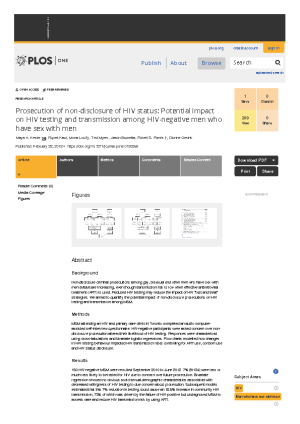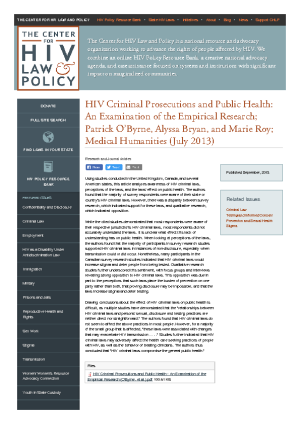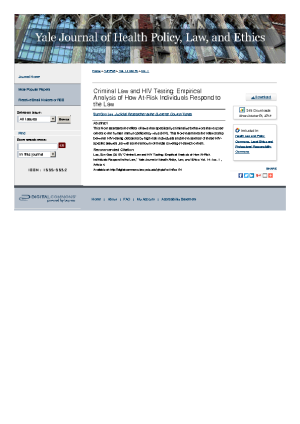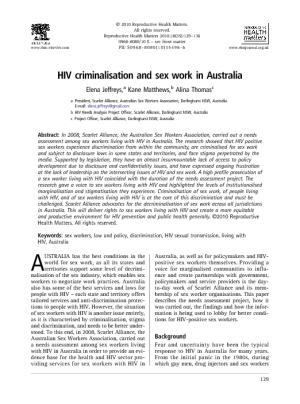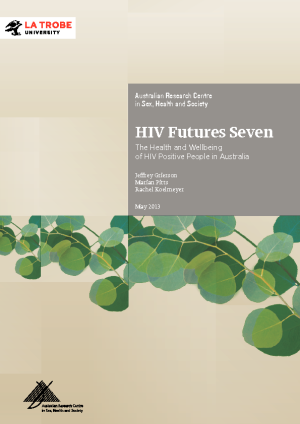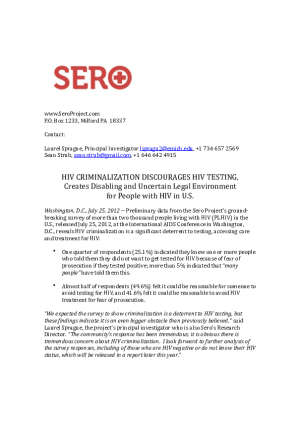Details the major areas of concern and the harm which both direct and indirect criminalization inflict on an individual’s human rights and the health of society as a whole.
Drives people from healthcare, including testing
There have been many anecdotal reports that publicity about HIV criminalisation drives people away from health care services. The studies listed below confirm those reports, showing that HIV-prosecutions increase a sense of state surveillance and undermine the therapeutic relationship healthcare providers depend on to facilitate frank discussion about risk taking behaviours. (For the effects of HIV criminalisation on service provision, see Makes prevention & healthcare more difficult.)
Countries that criminalise same-sex relationships, sex work and drug use have poorer HIV outcomes
Countries that criminalise same-sex relationships, sex work and drug use have significantly more people with undiagnosed HIV and lower rates of viral suppression than countries that do not criminalise, or criminalise these areas to a lesser extent. Countries with human rights protections in place fared much better than those without on these HIV-related indicators, according to an analysis by Dr Matthew Kavanagh of Georgetown University.
Prosecution of non-disclosure of HIV status: Potential impact on HIV testing and transmission among HIV-negative men who have sex with men
Aims to quantify the potential impact of non-disclosure prosecutions on HIV testing and transmission among MSM. Found that fear of prosecution over HIV non-disclosure was reported to reduce HIV testing willingness by a minority of HIV-negative MSM in Toronto; however, this reduction had the potential to significantly increase HIV transmission at the community level which has important public health implications.
HIV criminalization exacerbates subpar diagnosis and treatment across the US
Revisits the analysis described in Sweeney et al. (Association of HIV diagnosis rates and laws criminalizing HIV exposure in the United States), but stratifies the diagnosis rate into two response variables: i) the proportion of PLHIV diagnosed, and ii) annual percentage change in HIV prevalence. Counter to the conclusions of Sweeney et al., the researchers’ analyses indicate that laws criminalizing HIV exposure are associated with a lower proportion of HIV diagnosis and increased HIV prevalence.
Law, Criminalisation and HIV in the World: Have countries that criminalise achieved more or less successful AIDS pandemic response?
At the end of the 5-year strategy in which countries around the world focused their AIDS response on reaching people living with HIV with testing and treatment services, this article provides an ecological analysis of whether those countries with criminalising legal environments achieved more or less success. It found that countries that have adopted a criminalising approach to key populations saw less success than those that chose not to criminalise. This analysis suggests a new global AIDS strategy that includes a focus on law reform may hold promise in achieving goals that were missed in 2020.
HIV criminal prosecutions and public health: an examination of the empirical research
Concludes that HIV-related criminal laws either fail to influence or increase STI testing avoidance, unprotected anonymous sexual contacts, and avoidance of health care because respondents do not feel safe speaking with health professionals. Suggests HIV-related criminal laws compromise public health and clinicians’ abilities to establish therapeutic relationships and to undertake HIV prevention and treatment work.
Criminal law and HIV testing: empirical analysis of how at-risk individuals respond to the law
Found that people at high risk of HIV living in states with HIV-specific statutes were no more or less likely to report HIV testing. However, HIV testing decreased following media coverage of HIV cases. The application of criminal laws had a negative impact on HIV testing rates among those most at risk of HIV infection, adversely affecting public health.
Nondisclosure Prosecutions and Population Health Outcomes: Examining HIV Testing, HIV Diagnoses, and the Attitudes of Men Who Have Sex with Men Following Nondisclosure
Found that HIV testing and HIV diagnoses among men who have sex with men did not significantly statistically change after media releases about a local nondisclosure prosecution. However, some MSM expressed their belief that the local public health department openly shares information with police. Some HIV-positive participants perceived an association between local public health and police services which caused them to not access public health services.
Nondisclosure prosecutions and HIV prevention: Results from an Ottawa-based gay men’s sex survey
Details the relationships between nondisclosure prosecutions and STI/HIV testing practices. Only a minority of survey participants reported that HIV criminal prosecutions affected their willingness to get tested for HIV, or made them afraid to speak with nurses and physicians about their sexual practices. However, that group may also be at higher risk of HIV infection, reporting higher rates of unprotected penetrative anal intercourse and internal ejaculation with (on average) a higher number of different sexual partners within the previous two months. This same group also reported less STI/HIV testing and a preference for anonymous HIV testing.
The impact of criminalization of HIV non-disclosure on the healthcare engagement of women living with HIV in Canada: A comprehensive review of the evidence
Concludes that HIV-related criminal laws either fail to influence or increase STI testing avoidance, unprotected anonymous sexual contacts, and avoidance of health care because respondents do not feel safe speaking with health professionals. Suggests HIV-related criminal laws compromise public health and clinicians’ abilities to establish therapeutic relationships and to undertake HIV prevention and treatment work.
HIV Criminalisation and Sex Work in Australia
Reports that following the high profile prosecution of an HIV positive sex worker (no transmission), sex workers became fearful of HIV testing for HIV. In the four-week period following the court case, attendance at the sex worker outreach medical service dropped from an average of 40 per night to three.
HIV Futures Seven: The Health and Wellbeing of HIV Positive People in Australia
Survey of people living with HIV found 30% were concerned about disclosing their sexual practices to service provider (and 13% were uncertain) ‘because of the current legal situation’.
The Sero Project: National Criminalization Survey Preliminary Results
Survey of more than 700 PLHIV found that almost half felt it was somewhat reasonable or very reasonable to avoid testing because of fear of prosecution.
